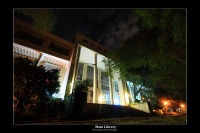UP Main Library: Difference between revisions
No edit summary |
Rsmoralejo (talk | contribs) No edit summary |
||
| Line 30: | Line 30: | ||
Today, there have been reports that the 50-year old structure has sunk a few inches together with the Sunken Garden because it is in the path of the dreaded Marikina Fault but the campus are undisturbed. | Today, there have been reports that the 50-year old structure has sunk a few inches together with the Sunken Garden because it is in the path of the dreaded Marikina Fault but the campus are undisturbed. | ||
Revision as of 15:58, 25 July 2011

The University Library of University of the Philippines, Diliman encompasses one Main Library and twenty-six College or Unit Libraries. It envisions global information exchange throughout the UP Library System. It is mandated to be the information resource center of excellence in the social sciences, humanities and basic sciences. It strives for full automation, a world-class collection and a staff of thoroughly modern information professionals.
The University of the Philippines, Diliman Library Collections have been developed in aid of teaching, research and extension work in the disciplines designated to Diliman. Topping the list of choice collections in University of the Philippines, Diliman are the Filipiniana Collections, which come in print, non-print and digital forms.
The University of the Philippines Main Library is the heart of the University of the Philippines, Diliman Campus. It was the first building to be erected after the University transferred from Manila to the Diliman campus. It is more popularly called “MainLib” than UP Main Library, its designated name. The Main Library is named after former U.P. President Bienvenido M. Gonzales. The Main Library is the library for the College of Arts and Sciences which has a numerous number of enrollees back then.
History
Every University Librarian since the University Library was established in 1922 has grappled with four basic concerns: the book fund, staff development, library services and information technology.
May Polk (1922-1924) from Indiana, USA, was the teacher of several heads of Philippine government libraries.
Gabriel A. Bernardo (1924-1957) built the Library in Padre Faura, giving it the reputation of being the best in Asia before the War. He rehabilitated and rebuilt the Library in Diliman after the War.
Marina G. Dayrit (1963-1981) systematized library services and the staff training, beefed up the library collection through Ford Foundation grants, developed the Filipiniana Special Collections and Archives, initiated microfilming and computerization.
Belen B. Angeles (1987-1999) obtained a Ford-Mellon grant to develop the humanities, social sciences and general science collections and to purchase license to use CDS/ISIS. She opened Media Services, converted the Filipiniana Collection to machine-readable form, opened the Online Public Access Catalog (OPAC), CD-ROM and INTERNET services.
Salvacion M. Arlante (1999-Present) launched the University Library Web site; purchased the integrated library system MAELISA; adopted the policy of access versus holdings; promoted the welfare of the Research, Extension and Professional Staff; and is exploring alternative information technologies.
The UP Main Library Building
The building is designed by University Architect Cesar Homero Rosales Concio. The construction of the University Main Library started in May 1949, four months after the transfer, and was finished in June 1950. This colonial building stands in the very amidst of the campus making it accessible to the densely-populated colleges around the Academic Oval such as Malcolm Hall, Melchor Hall, Palma Hall and Benitez Hall.
The building is rectangular which is 102.75 meters long and 20.55 meters wide with four floors including the basement having a total floor area of 14,613 square meters. It also has a stacks unit extending to the rear from the center, measuring 27.4 meters long and 20.55 meters wide. The building faces east, exposing readers inside to the rays of the sun whole day. The building is modular in design and function having 6.85 by 6.85 meters of structural bay. Inside the building, its fixed structures consist only of the stairs, elevator and booklift, and toilets. Due to this functional design of the building, librarians are able to transfer or change the location and organization of the various library functions as needed. The roof deck was added in 1960 which is now used for Archives Section.
Since 1960’s to the early 1990’s, the Main Library is bonded with learning because it is also shared by the College of Architecture and Fine Arts on the building’s third floor. The south wing is assigned for fine arts majors while the north wing is assigned for the architecture majors. By 1970, the two academic authorities became two separate colleges. The College of Fine Arts remained at the Gonzales Hall while the College of Architecture moved near Melchor Hall. In 1991, the College of Fine Arts finally found an independent home at Bartlett Hall.
Today, there have been reports that the 50-year old structure has sunk a few inches together with the Sunken Garden because it is in the path of the dreaded Marikina Fault but the campus are undisturbed.
Services
The Main Library serves primarily the students, faculty members and staff of the UP College of Arts and Letters, and the UP College of Social Sciences and Philosophy and also caters to all university constituents and outside researchers.
It is organized into three major divisions which covers the various functional sections:
- Technical Services Division which formulates and adopts standard acquisition, cataloging and indexing policies and procedures;
- Administrative Services which provides support to the functional sections/units of the Library; and
- User Education and Services Division which lends books and provides reference, research and bibliographic services; maintains and preserve books, documents and archival materials; undertakes user education programs; and maintains computerized database applications.


